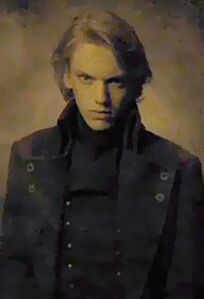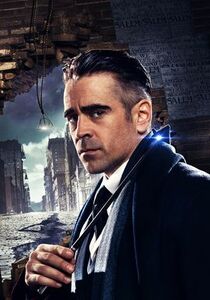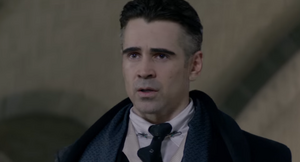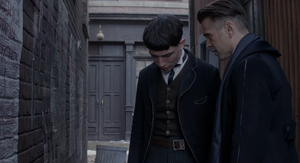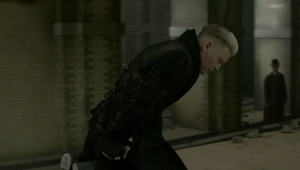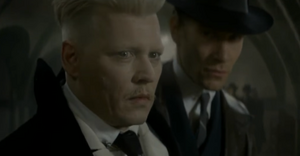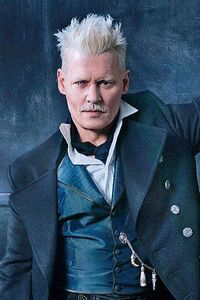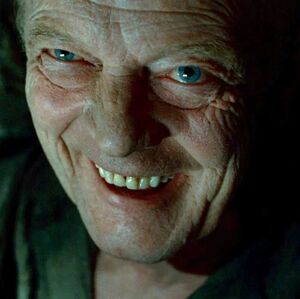| “ | For The Greater Good. | „ |
| ~ Grindelwald's slogan. |
Gellert Grindelwald is a flashback antagonist, yet very important background character and historical figure from the Harry Potter series of books and their movie adaptations. He is also the main antagonist of the prequel series Fantastic Beasts, appearing as the main antagonist in its first installment and will return in its sequel.
In Fantastic Beasts, Grindelwald is shown as a force which has the worldwide wizarding community cowering in fear. Although not yet at the height of his powers, Grindelwald wreaks havoc and death in some big parts worldwide before eventually going undercover. Fleeing Europe, Grindelwald arrives in America where he intends to harvest the powers of a magical beast called Obscurus to use them against his enemies. During his stay in the United States, Grindelwald goes under the alias of "Percival Graves", a high-ranking Auror and director of Magical Security for MACUSA. Grindelwald later attempted to take over Europe during the Second World War, but was defeated by his former friend and ally Albus Dumbledore in 1945 and imprisoned until his death at the hands of his successor, Lord Voldemort.
In Harry Potter and the Deathly Hallows - Part 1, the younger version of Grindelwald was portrayed by Jamie Campbell Bower, while the older version was portrayed by Michael Byrne, who also played Colonel Vogel in Indiana Jones in the Last Crusade. In the Fantastic Beasts film series, he was portrayed by Colin Farrell, in his disguise as Percival Graves, and by Johnny Depp as Grindelwald himself. Johnny Depp also portrayed Sweeney Todd, The Wolf and Lenfranco Cassetti, and Colin Farrell portrayed Jerry Dandridge, Bobby Pellitt and Charles Ambrose. Both actors also portrayed Tony Shepard in The Imaginarium of Doctor Parnassus.
History
Early Life
Gellert Grindelwald was schooled at Durmstrang Institute, a reputed school of wizardcraft in Northern Scandinavia, rather infamous for its tolerance towards the Dark Arts, but was expelled at sixteen years old due to his unhealthy experiments. He then took up a friendship with Albus Dumbledore (who wound up falling in love with him) when he lived in Godric's Hollow for a summer with his great-aunt Bathilda Bagshot, following his expulsion.
Keenly interested in history, lore, and the powerful mystique of magical artifacts, Grindelwald became fascinated with the Deathly Hallows, to the point of appropriating their runic symbol as his own personal emblem and engraving it on the walls of Durmstrang prior to his departure.
After expulsion, Gellert's quest for information about the Hallows led him to Godric's Hollow, England, where Ignotus Peverell, said to have been the first owner of Death's Cloak of Invisibility, had been laid to rest. Conveniently, his great-aunt, acclaimed wizarding historian Bathilda Bagshot, lived there and provided a place for him to stay, complete with a treasure trove of books and documents and a minimum of supervision. It was in Godric's Hollow in late 1898 or early 1899 that Grindelwald met and befriended Albus Dumbledore. The two teenagers had a lot in common: they were class-topping intellectuals and talented young wizards who were idealistic and ambitious. Albus, who felt trapped in a boring town out of familial obligation, gained a glamorous and attractive connection to the excitement of faraway places and things in Gellert. Gellert, an ego case, gained a powerful ally, complete with stimulating conversation, who didn't threaten his sense of control. It is clear that the pair were very close and the friendship was genuine on both sides. They shaped one another's ideas, powers, as well as destinies from that day forth.
They also shared two preoccupations. The Deathly Hallows held their fascination for many shared reasons, but their most fundamental reasons they did not quite have in common. Gellert wanted (together with his friend) to acquire all three and wield the power of Master of Death.
They also dreamed of overturning the Statute of Secrecy and creating a new order in which wise and powerful wizards and witches were the benevolent overlords of their world, including Muggles. Again, Dumbledore's reasons were subtly different from Grindelwald's: as a young man, Dumbledore had witnessed and been powerless to stop a group of Muggle boys tormenting his younger sister, Ariana, to the point that the sweet-natured girl suffered an emotional breakdown and her repressed magic became dangerously unstable. Dumbledore's father was sent to Azkaban for taking revenge on the Muggle boys and his mother was killed in one of Ariana's accidents. He wanted power to protect his loved ones (and by extension the whole world) against cruelty and xenophobia like that shown by the Muggles. They coined the phrase that would become Grindelwald's slogan and the justification for his moral indiscretions and atrocities: "For the Greater Good".
The friends' plans to leave Godric's Hollow, acquire power, and begin their revolution turned serious. When Dumbledore's brother Aberforth became aware of this in the summer of 1899, he was disgusted with Albus's ambition, but was concerned about it as well, knowing that he and Ariana would need to be brought along as she would not receive the care and attention she needed to keep her stable. The tense situation boiled over into a confrontation and Grindelwald, enraged, inflicted the Cruciatus Curse on Aberforth. Albus moved to defend his brother, igniting a vicious three-way duel in which Ariana was accidentally killed. Aberforth and Albus were devastated. Presumably Grindelwald was also remorseful, as there is no evidence he was an emotionally cold person. Unwilling to face Albus, he fled the country and received putative blame for Ariana's death, thus confirming his place on the wrong side of the law and touching off his career as a Dark revolutionary, which would last until 1945.
Following his acquisition of the Elder Wand Grindelwald began amassing an army of followers. Eventually he and his legions of "fanatics" launched several devastating attacks across Europe, committing mass-slaughter, and garnering international attention from wizarding authorities. Several of the attacks also drew the attention of the Muggle world, risking exposure and war. In response to Grindewald's actions an international wizardhunt ensued, and was reported on in periodicals such as the Daily Prophet and the The New York Ghost
At some point Grindelwald was almost captured, but was able to evade his pursuers, and disappear. Magical Congress of the United States of America President, Seraphina Picquery would later lay the blame for Grindelwald's escape on Swiss delegate Heinrich Eberstadt, claiming that he had let the dark wizard "slip through his fingers".
Fantastic Beasts and Where To Find Them
Unbeknownst to Picquery, Grindelwald had already infiltrated MACUSA by assuming the identity of her right-hand man Percival Graves. Grindelwald believed the mysterious attacks occurring in New York City to be the work of a powerful Obscurial, which he felt would be a great asset for his plans of world domination. Using his disguise as Graves, Grindelwald came into regular contact with Credence Barebone, whom he believed to be connected to the Obscurial due to a vision he received. Believing Credence was an orphaned Squib, Grindelwald pretended to be his father figure and manipulated him into helping him find the Obscurial with the promise of protecting him from his abusive adoptive mother and teaching him magic.
During this time, Grindelwald (as Graves) arrested Newt Scamander, whose escaped beasts were believed by MACUSA to be the cause of the Obscurial's attacks. During his interrogation, Grindelwald discovered the Obscurus within Newt's suitcase, and in an effort to hide his tracks, had him and Tina Goldstein sentenced to death. Afterwards, he approached Credence after Mary Lou Barebone was killed by the Obscurial and had him track down his adoptive sister Modesty Barebone, believing her to be the source of the Obscurial. Once they found Modesty, Grindelwald cruelly rejected Credence, as he had no further use of him.
| “ | Will we die, just a little? | „ |
| ~ Grindelwald's last words before he is taken. |
This angered Credence, who then revealed that he was the Obscurial, much to Grindelwald's surprise. Grindelwald attempted to convince Credence that he had nothing to fear any more and to join his ranks, but this further angered Credence who began rampaging through the city. After the Obscurial's death at the hands of the Aurors, Grindelwald was apprehended by Newt, who then revealed his real identity.
Massing his forces
Grindelwald eventually established a prison, Nurmengard, to serve as a form of containment for his enemies, apparently sufficiently impregnable that he was later imprisoned in it, inaccessible to his former supporters and breached only by Voldemort. In what few accounts of Grindelwald's revolution exist, his great power as a wizard is mentioned often, but there is less mention of his crimes. One murder is noted, that of Viktor Krum's grandfather, and presumably there were others. He was also noted to be capable of darkness from a young age: he and Dumbledore discussed quite openly the idea of ruling Muggles as benevolent overlords, and suggestions were made to the effect that his experiments were too dark even for Durmstrang, a school with a dark reputation to begin with, leading to his expulsion.
Battle Against Dumbledore
In 1945, at the height of his power, his former friend Dumbledore confronted him due to the cries of the public and defeated him in what became known as a legendary duel. Albus Dumbledore hesitated to confront Grindelwald, despite the belief held by many, including quite possibly both men themselves, that he was the only wizard skillful enough to stop his former friend. His reasons for hesitating may have included residual affection for his ex-flame, residual sympathy for his revolutionary goals, or shame over his role in shaping Grindelwald's revolution, but the reason Dumbledore himself gave Harry was that he was afraid Grindelwald knew better than he did who exactly was responsible for killing Ariana and he didn't want to find out. But Dumbledore, at this point about 63 years old and Head of Transfiguration at Hogwarts, was finally importuned by people who suffered from his former friend's actions to move against him. Eyewitnesses stated that it was the greatest duel ever fought between wizards. Dumbledore bested Grindelwald, becoming the master of the Elder Wand. He was convicted and imprisoned in the topmost cell of Nurmengard, where he spent the rest of his life until his murder by Voldemort.
Death
53 years after his defeat, Grindelwald was slain in his prison cell by Voldemort, who was searching for the Elder Wand for himself. It was only during the confrontation in Grindelwald's cell that Voldemort learned Albus Dumbledore had claimed the wand long ago. Grindelwald showed no fear during this confrontation and saying he welcomed death apparently feeling remorse for his past actions. In a rage Voldemort ended Grindelwald's life with the Killing Curse in the spring of 1998.
Personality
Grindelwald was charming, brilliant and enthusiastic as a young wizard. His attraction to the Dark Arts, noted previously, was predictable given his personality and background, and partially malevolent in its initial stages, although initially more in self-interest. He was highly intelligent, magically talented, idealistic, as well as ambitious to the point of ruthlessness, with a vicious temper: for example, when Aberforth Dumbledore challenged his and Albus's plans and tried to convince his brother to abandon them, Grindelwald "lost control" and used the Cruciatus Curse on Aberforth. This displays that Grindelwald was not only fully willing to cause pain to those who oppose him, but he also was capable of taking enjoyment in it. This was evidenced further when Grindelwald, rather than simply and effortlessly killing Newt upon overpowering him years later, chose to torture him first.
While arrogant and self centered, Grindelwald was capable of recognizing talent in others and forming close attachments to others. He had very little patience for those he considered to be below him. While he considered and treated Albus Dumbledore as an equal, he was dismissive of the less talented Aberfoth and the permanently damaged Ariana. Also evidenced further was while Grindelwald praised the tremendous power of Credence Barebone as an Obscurial, he initially callously dismissed him as he believed him to be a Squib, implying that Grindelwald had a weakness for jumping into conclusions when he had thought it to be clear. He also appears to value power and skill as he questioned why Newt was favored by Albus, as he apparently saw Newt as only a mediocre wizard and thus unworthy of having the favor of someone as powerful and great as Dumbledore.
There is evidence that Grindelwald regained some perspective after his downfall. When Grindelwald faced certain death at the hands of the only Dark Wizard to ever be considered more powerful and dangerous than himself; he was openly defiant and even mocking, goading Voldemort into killing him. Indeed, he seemed to exhibit a grotesque remnant of the "merry, wild" temperament of his youth. His last words consisted of the dressing-down of Voldemort and a rather demonstrative outlook on "the next great adventure" seems clear in its connection to his old friend, Albus Dumbledore.
Perhaps due to his great skill and beliefs in his own superiority, Grindelwald was almost fearless. This is best shown during his aforementioned encounter with Lord Voldemort where he neither feared the Dark Lord's power or the likelihood of death. His nearly complete lack of fear was shown by the fact that he was unfazed when captured by MACUSA despite their tendency to execute captured criminals. Even in conditions when he felt fear, Grindelwald could still display a remarkable amount of calmness, as he confidently and calmly tried to recruit Credence in his phenomenally dangerous Obscurial form. The only one Grindelwald did seem to have genuine fear of appears to be Albus Dumbledore, as he quickly fled the scene after Ariana was killed trying to intervene in a duel he started, and later in life when he refrained from attacking England despite his possession of the Elder Wand out of fear for his former friend. Dumbledore himself later told Harry that he believed that Grindelwald feared the possibility of dueling him.
Despite all his evilness, Grindelwald was ultimately a lesser villain compared to Voldemort. Unlike Voldemort's self-serving actions, Grindelwald did what he genuinely believed was the best for the wizarding world and another notable difference is how Grindelwald is known for not having any predjuice for Blood Statuses and welcomed anyone with magic without caring for their heritage. Grindelwald also seemed genuinely shocked by Ariana's death enough that he chose to fled rather than face Albus, apparently implying even at his worst, he still held on to their friendship and proved this by although he would be better off without Dumbledore, Grindelwald never attempted to send or take advantage of anyone to use at his old friend. He remarkably did not hate Muggles but considered them as being merely inferior beings who needed to be taught their place and despite his ruthlessness towards Muggles, he did believe that with magic, humanity would advance and extended this even to Muggles. By his last days, Grindelwald seemed to have contemplated on his actions and began feeling remorse for them, enough so that when Voldemort came, Grindelwald denied ever having the Elder Wand in an attempt to redeem himself and he seemed to show his care for Dumbledore by not telling him it was in his grave, proving he retained some respect and affection for Dumbledore despite Dumbledore being the reason of his defeat.
Powers and Skills
Grindelwald was outstandingly talented even while still a student at Durmstrang, though he did not, like Dumbledore, channel his abilities into attaining awards and prizes. As an adult, Grindelwald became an exceptionally powerful and accomplished wizard, considered to be one of the most powerful and dangerous dark wizards of all time (considered to be surpassed only by Voldemort), feared by many of the wizarding world during his reign of terror, Even Dumbledore considered Grindelwald to be his equal in power and almost on par in terms of skill. As a former master of the Elder Wand, Grindelwald's already formidable magic was further enhanced by the artifact's legendary powers, allowing him to perform extraordinarily powerful spells that would normally be magically impossible to perform. Even while utilizing Percival Graves's wand to maintain a disguise (with it being unclear whether or not he had properly won said wand), Grindelwald was still extremely powerful and dangerous, performing feats that required immense magical power.
- Magic: Grindelwald was noted to be extremely talented and prodigiously skilled while still a student of Durmstrang Institute, and his magical mastery was considered to match that of Albus Dumbledore, which induced the two young men to quickly befriend one another in their youth. As an adult, Grindelwald was considered to be one of the most powerful Dark Wizards of all time and with the Elder Wand enhancing his already tremendous ability, Grindelwald successfully terrorized much of wizarding world, defeating so many in his reign of terror that Dumbledore eventually was deemed the only wizard who could possibly stand any chance of defeating Grindelwald. In the end, Grindelwald's power proved to be great enough that Dumbledore, despite his strong desire not to engage Grindelwald, was eventually forced to take action. While he was ultimately defeated by his old friend in a duel of legendary proportions, Dumbledore himself would later admit that he had been only "a shade more skillful" than Grindelwald.
- Dark Arts: Grindelwald was exceptionally talented in the Dark Arts and possessed a passion for it even from a young age. Even when he was still only a student of Durmstrang, Grindelwald's experiments in the Dark Arts were already very dangerous, even nearly fatal to the fellow Durmstrang students he attacked; eventually his "twisted experiments" became too dangerous for even Dumstrang's tolerant outlook on the Dark Arts, resulting in his expulsion. Even While still seventeen, Grindelwald was already adept at casting the extremely powerful Cruciatus Curse, which was one of the three Unforgivable Curses and required a considerable level of magic, notably using it against Aberforth Dumbledore. By the time he became an adult, Grindelwald was widely considered to be one of the most powerful Dark Arts practitioners, While impersonating Percival Graves, Grindelwald displayed the ability to cast a curse that was quite painful to those who were hit by it, which he used to torture Newt Scamander.
- Charms: Grindelwald was extremely skilled in charms. Albus Dumbledore claimed that when he was still seventeen, Grindelwald could already cast a Disillusionment Charm strong enough to effectively render himself invisible without needing to use an invisibility cloak, which is a tremendous feat. As such, the Cloak of Invisibility would be the Hallow that Grindelwald was least interested in, and continued his search for it only because the Cloak completed the trio of legendary artifacts. Grindelwald was also capable of casting an extremely powerful shield charm that can protect him from a barrage of spells fired at him by around 24 Aurors simultaneously with little effort.
- Healing magic: Grindelwald had a high understanding of healing charms, being able to heal the cuts on Credence Barebone's hands by simply touching them.
- Transfiguration: Grindelwald was exceptionally proficient in Transfiguration, even at the highest levels, such as Human Transfiguration. His skills in Human Transfiguration was sufficient to transform himself to assume the identity of Percival Graves for an extended period of time without raising suspicions.
- Apparition: Like most adult wizards, Grindelwald was able to Apparate. However, he is capable of Apparating with great speed and precision, allowing him to avoid the violent attacks of Credence's Obscurus with relative ease.
- Occlumency: Grindelwald was an incredibly accomplished Occlumens, being able to fully conceal his true thoughts from the exceptionally talented Legilimens Queenie Goldstein while in his Percival Graves disguise. Even Lord Voldemort himself, who was reputed to be the most accomplished Legilimens alive, was unable to penetrate Grindelwald's mind to gain information in his search of the Elder Wand.
- Divination: Grindelwald was a Seer. He had a vision about the existence of a powerful Obscurial linked to Credence Barebone. However, he is not an expert in this magical field, as Grindelwald initially misinterpreted the vision, believing that Credence would lead him to the child while in fact, Credence was the Obscurial himself. It should be noted, however, that Credence is the only known Obscurial ever to have lived past the age of 10, so Grindelwald could possibly not have anticipated this.
- Wandless and Nonverbal Magic: Grindelwald was exceptionally skilled in both wandless and nonverbal magic, either of which is highly advanced and often difficult to perform even individually, making Grindelwald's prowess all the more impressive, as he usually performed both simultaneously. In 1926, Grindelwald Summoned Newton Scamander's wand and suitcase over to him, both with a silent wave of his hand. Grindelwald also wandlessly lifted Newt Scamander from the ground from across the room and then made him, Porpentina Goldstein and Jacob Kowalski simultaneously drop to their knees with their arms locked behind against their backs. When he interrogated Newt soon thereafter, he Summoned the protective orb containing an Obscurus by silently gesturing it forth. He later saved the life of Credence Barebone from an oncoming train in the New York City Subway by hurling him sideways off the tracks with a wave of his wand. He was even able to send an automobile flying across a street at Tina Goldstein with a silent wave of his hand. By using only silent hand gestures, he generated forceful shockwaves to move and otherwise exert force on people and objects. He was able to break apart the ground by sending a shockwave rippling through it, notably performing this on the train tracks Newt Scamander was standing on to knock him down. Grindelwald later fended off around 20 Aurors simultaneously without speaking a single incantation. Grindelwald also healed the cuts on Credence's hand by silently running his own over it.
- Dueling: Gellert Grindelwald was a duelist of almost unrivaled skill. Having received thorough training in dueling and martial magic during his schooling at Durmstrang, Grindelwald was able to hone his skills to match his extraordinary high potential, becoming a fully confident, focused, disciplined and versatile master of combative sorcery, his reactions "marvelous, astounding". Though quite capable of performing magic of immense and destructive power as seen in how he made short work of the five European Aurors who were searching for him, he generally seems to prefer to engage his adversaries in a more traditional and formal manner and defeat his foes in a more "fair fight", showing a surprisingly defensive dueling style compared to the aggressive dueling style of Voldemort, deflecting his opponents' efforts to magically best him with ease. Even as a teenager, Grindelwald was already highly proficient in martial magic, Having effortlessly overpowered and Stunned Gregorovitch efficiently enough to master the Elder Wand and held his own against Albus and Aberforth Dumbledore simultaneously during their three-way duel when they were in their late teens. As an adult, armed with the Elder Wand, Grindelwald's dueling skills made him look nearly unbeatable, as he defeated and killed many witches and wizards during his reign of terror in wizarding Europe. He also overpowered the extremely skilled Percival Graves so he could disguise himself as him and infiltrate MACUSA. While impersonating Graves, Grindelwald still displayed tremendous dueling skill, winning every single one-on-one duel (swiftly besting and torturing Newt Scamander, and easily fending off former Auror Tina Goldstein), and upon being unmasked, Grindelwald not only easily fended off more than 20 highly-trained MACUSA Aurors, but he also quickly started to overwhelm with little difficulty (quite possibly managing to defeat them all had Newt not restrained him from behind). Ultimately, as a testament to his immense dueling skills, Grindelwald was even able to go toe-to-toe with Albus Dumbledore, indeed, their legendary duel has entered History as possibly the greatest duel ever fought between two wizards, with Dumbledore saying he had only been slightly more skillful.
- Intellectual Genius: Grindelwald was not only a great wizard, but also possessed an incredible intellect, as he was considered to be equally brilliant to Albus Dumbledore, who was himself considered the most brilliant student at Hogwarts up until that point when both of them were seventeen. Indeed, Grindelwald and Dumbledore's intellects were so complementary to one another, that, according to Bathilda Bagshot, even after spending an entire day in intellectually stimulating discussions with Grindelwald, Dumbledore would still unexpectedly send Grindelwald messages by owl right after sudden ideas struck him, with him having to let Grindelwald know of them immediately. As an adult, aside from his ability to create complex and carefully-woven plans to achieve his goals, such as subtly apprehending President Picquery's right-hand man Percival Graves and infiltrating the MACUSA by assuming his identity, Grindelwald was able to perfectly mimic the personality and American accent of Percival Graves, and convincingly carry out his many duties as an Auror, the Head of MACUSA's Department of Magical Law Enforcement, and the Director of Magical Security, while also gradually managing to locate the rampaging Obscurial, all without arousing suspicion.
- History of Magic: Grindelwald had good knowledge of magical history and lore, especially the portions of it that pertained to powerful magical artifacts such as the Deathly Hallows and wandlore. For example, he knew that Ignotus Peverell, owner of the Cloak of Invisibility, had been laid to rest in Godric's Hollow. He also was aware that in order to become the master of the Elder Wand, he needed to not only steal it, but he also had to defeat its previous owner.
- Charisma: Even as a young man, Grindelwald was highly talented in manipulating others, such that he was able to manipulate the extremely intelligent Albus Dumbledore into agreeing to his ideas of revolution and only Aberforth's timely intervention stopped Albus. As an adult, his skills in manipulating grew even further, with Theseus Scamander describing him as a "charismatic blighter" and Grindelwald successfully convincing many wizards and witches to join his cause. He was also able to effortlessly manipulate Credence Barebone into trusting him by looking as a kind mentor to him, to the point that Credence was completely unaware that Grindelwald was merely using him. He was also shown to be confident that he could eventually get Credence in his Obscurus form to listen to him, which made him enraged when he was seemingly destroyed by MACUSA Aurors.
Quotes
| “ | Kill me, then! You will not win, you cannot win! That wand will never, ever be yours! | „ |
| ~ Grindelwald taunting Voldemort, shortly before his death. |
| “ | A law that has us scuttling like rats in the gutter! A law that demands that we conceal our true nature! A law that directs those under its dominion to cower in fear lest we risk discovery! I ask you, Madam President — I ask all of you — who does this law protect? Us? Or them? I refuse to bow down any longer. | „ |
| ~ Grindelwald, disguised as Percival Graves, explaining his motives. |
Gallery
Trivia
- In the film adaptation of the final book, Grindelwald does not redeem himself as he does in the book, as he tells Voldemort where to find the Elder Wand. Though his death is not made obvious, there is a flash of light as Voldemort Disapparates that could have been the Killing Curse.
- WatchMojo.com listed Gellert Grindelwald as among their honorable mentions on their Top 10 "Most Evil Harry Potter Characters" list.
- Both Johnny Depp and Jamie Campbell Bower started Sweeney Todd: The Demon Barber of Fleet Street (2007) as Benjamin Barker and Antony Hope along with Alan Rickman (who played Severus Snape) as Judge Turpin.
- Albus Dumbeldore defeated Grindelwald in 1945, there same year the Axis-powers were defeated in WW2.
- For unknown reasons, Grindelwald has been described to be inferior to Voldemort, even despite his possession of the Elder Wand and own immense magical powers and skills and having proven himself to be a difficult challenge for Dumbledore at his prime, whereas Voldemort was shown to be calmly dominated by Dumbledore at his old and weaker days, albeit granted Dumbledore had most of his prime's magical abilities due to the Elder Wand backing him. The fact that Dumbledore himself described Grindelwald as being his equal in power and almost as skilled as he is in his prime yet still noted Voldemort was the most dangerous dark wizard of all time is also absurd.
- It could be because that despite his faults, Grindelwald was ultimately a lesser evil compared to Voldemort, as while both had commited unspeakable crimes, Grindelwald did so not out of a desire to gain power but to free his wizardkind from having to hide from Muggles whereas Voldemort only ever wanted to be the supreme ruler of the world. In addition, Grindelwald was capable of feeling remorse and died with a shred of redemption whereas Voldemort never felt any guilt and died completely evil.
- It could be that Grindelwald surpassed Voldemort in magic and intelligence but was never as malevolent as he was.
- It could also be due to the fact that most who described Voldemort as more powerful and dangerous than Grindelwald weren't born or around during the height of Grindelwald's power and only had knew of his power and atrocities from learning them second-hand from those who did witness it and those same people did witness Voldemort's rise to power and the terror that cam with it and thus could not truly compare to two to each other and would be biased to considering Voldemort the more powerful and terrifying wizard due to having experienced his reign of terror but not Grindelwald's.
Sources
- This article uses material from the Gellert Grindelwald on the Harry Potter wiki at Wikia and is licensed under the Creative Commons Attribution-Share Alike License.

